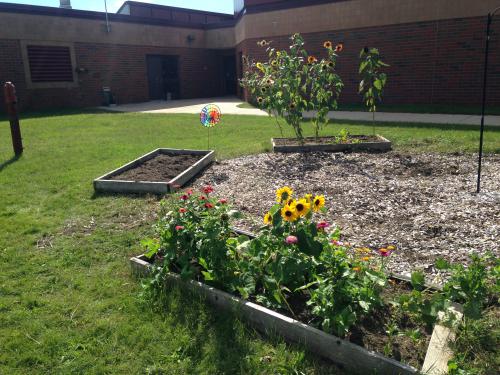Giving back to a community garden
FoodCorps service member recognizes the 9/11 National Day of Service in Suttons Bay school garden.

I don’t know much about gardens, but I do know one thing: they require time and hard work. Although some part of me knew this, I experienced it first-hand yesterday as I kneeled in the hot sun, uprooting hundreds of tenacious weeds.
As a FoodCorps Service Member, I was encouraged to complete a National Day of Service and Remembrance in honor of Sept. 11. On Monday, Sept. 12, I traveled to Suttons Bay Public Schools, the same school where I graduated from in 2012, and did a work day at their garden. It’s a garden that I have a special attachment to, not just because I attended 12 years of school on those grounds, but also because I built many of the beds with the help of Kirsten Gerbatsch, a previous FoodCorps service member, as my high school senior project.
Kirsten served FoodCorps at Suttons Bay Public Schools in the year 2012. When 17-year-old me approached her with the desire to turn a patch of weeds behind the elementary school into a children’s garden, she supplied me with knowledge, funds and her own physical labor to make it happen. When we put the finishing touches on that garden, I never imaged that almost five years later, I would return and dig into the same dirt, only this time, as a FoodCorps member myself.
I also never would have imagined how neglected the garden would become. On Monday, I found paths overgrown, raised beds filled with weeds, and unruly bushes. We built the garden in the hopes that generations to come would use it for hands-on learning and beautifying the school. I am sad to say it has not achieved either of those goals in the last few years.
There is no one to blame in this case of disrepair. It is unfortunately a common occurrence for school gardens, since summer is not only the time that gardens need the most love, but also the time that schools close. I gave the Suttons Bay garden some “TLC” by weeding, raking, pruning and nailing together some of the raised beds. It was hard work, but I sweat and shoveled with the hope that by completing the overwhelming task of getting the garden useable again, it will inspire others to utilize the space.
This can be a lesson for all schools struggling to maintain a garden. In order to prevent the garden from neglect, it will take more than just the staff of the school. Parents, students and community members can all contribute to maintaining the space for what it was intended. Like I said, I don’t know much about gardens, but I have learned in my work that it takes a committed community to maintain one.

Garden beds at Suttons Bay Public after Julia's day of service.
Many excellent resources exist to support lasting and enriching school gardens.
- Let’s Move School Garden Checklist
- U.S. Department of Agriculture School Gardens Fact Sheet
- U.S. Department of Agriculture School Garden Question & Answer
- Center for Ecoliteracy Getting Started: A Guide for Creating School Gardens as Outdoor Classrooms
Julia is completing her service with Michigan State University Extension in Grand Traverse and Benzie counties. MSU Extension Grand Traverse County is one of six local service sites for FoodCorps in Michigan. Service sites are FoodCorps’community partners who are responsible for guiding service members as they make measureable differences in supporting school health. Foodcorps partners with school communities to create healthy school food enviornments with staying power by transforming students’ experience of food in schools in three key areas: hands-on learning, healthy school meals and schoolwide culture of health.



 Print
Print Email
Email


